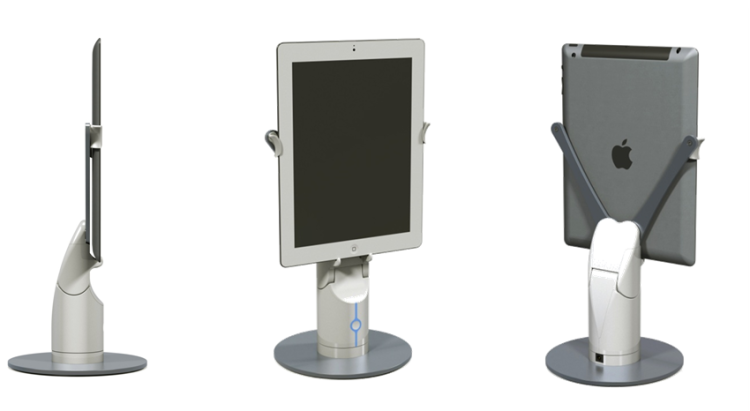 Everyone, it seems, wants to build a telepresence robot that moves. Revolve Robotics, however, wants to build a telepresence robot that doesn’t break the bank.
Everyone, it seems, wants to build a telepresence robot that moves. Revolve Robotics, however, wants to build a telepresence robot that doesn’t break the bank.
So Revolve built Kubi, a robot that swivels and tilts … but stays put wherever you place it.
“The whole moving avatar thing is pretty cool,” CEO Marcus Rosenthal admits. “But, not only is it a bit creepy — with people driving up behind you and looking over your shoulder — it’s pretty expensive.”
In fact, Rosenthal says, 80 percent of the value of a telepresence robot is in a specific room, not in moving around. And 90 percent of the cost is the ability to move. Sold on those two premises, the Revolve team built a, yes, revolving robot that neither walks nor rolls.
Simply attach your iPad to the Kubi base, and you’ve got instant telepresence capability.
I’ve seen a lot of these lately. Double Robotics has built a very elegant, beautiful system retailing in the $2,000-2,500 range. Suitable Technologies has built a Lamborghini that looks like a Chevette, selling for a considerably higher $16,000.
Kubi, on the other hand, will retail for $250, with introductory pricing at $199. (Of course, you will need an iPad.)
Which means, Rosenthal is at pains to emphasize, that a company can buy 10 Kubis for the price of one Double. Or 80 for the price a single Suitable Technologies robot. That’s significant, and it also means that people can buy Kubis for their homes.
“This is affordable for the consumer,” Rosenthal says. “You can bring it into your home — families with young children can use it to meet the grandparents. And it’s also very effective in a business meeting.”
To use Kubi, you download an iOS app — yes, Android is coming — and connect with a Kubi. Once authenticated, you can tilt, zoom, swivel … you’re in charge. That’s critical to the user experience, Rosenthal says. Alternatively, Kubi will allow login directly from the web — no mobile device required.
Revolve Robotics is largely self-funded, plus the team has $50,000 from Lemnos Labs, hardware startup accelerator. The team is also planning to run an IndieGoGo campaign to raise more funds without diluting their ownership.
It’s a cool and cheap piece of hardware.
My question is whether users might not just go with the cute — and moveable — Romo personal robot, which is even cheaper, at $150, and only requires an old iPhone or iPod Touch, rather than an iPad.
VentureBeat's mission is to be a digital town square for technical decision-makers to gain knowledge about transformative enterprise technology and transact. Learn More


